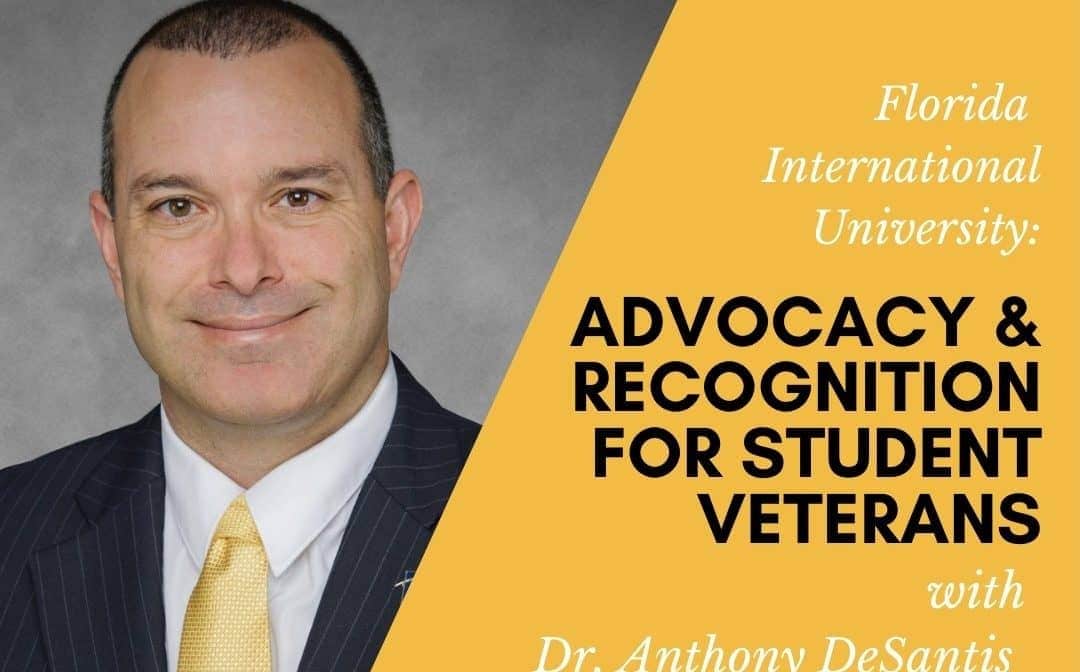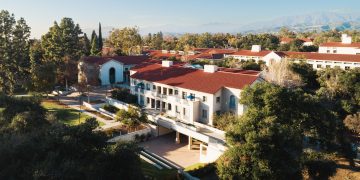Advocacy and Recognition for Student Veterans
Colleges of Distinction’s mission is to help students from all backgrounds, identities, and experiences find the best well-rounded, inspiring undergraduate education for them. And so, we are excited to further highlight schools that dedicate resources to the service of one of our nation’s most underrepresented populations: service members and veterans of the military.
Institutions with the Military Support Recognition are aware of the unique challenges military students face on college campuses. These institutions are proud to support and cultivate the skills that military students bring to the classroom, all while helping them achieve their personal and professional goals.
Dr. Anthony DeSantis serves as the Assistant Vice President, BBC for the Division of Academic & Student Affairs and provides divisional leadership to the office of Veterans and Military Affairs for Florida International University. In this interview, Dr. DeSantis and Ana-Marcela Lopez discuss the importance of individualized attention to help student veterans make the most of their college experience.
Lopez: Can you tell me a little about your journey to working with veterans in higher education?
Dr. DeSantis: I didn’t serve myself, but my father did, so I’m a dependent. But I’ve been working with student veterans for six years now. I did it at my former institution, the University of Florida, and when I came here they saw I had that experience. It’s been a lot of fun helping out here.
Lopez: So you said you were a dependent. Is that how you did your undergrad and so on?
Dr. DeSantis: Actually, I talked to my father about this before he passed, but I asked him why I never used his benefits. Unfortunately he never utilized the VA after he served in Vietnam. He tried to get his benefits for disability 9 years before he passed. He finally received them a few months before he passed, so it essentially took him 9 years to get his benefits. Luckily he was able to get them and transfer them to my mom. But I never knew. At that point in the early nineties, so I just didn’t know it was an option, and I didnt think my dad did either. I wish I did! That would have been really helpful. But no, I started at the University of Florida. I actually started the collegiate Veterans Success center there. We had built a center from scratch and then built the program from the ground up. I did that for four years. And here at FIU, I just started in January overseeing the office. It’s been amazing. They do a really great job with the certifying aspect, but it was really the programmatic piece that we were missing. I had that experience prior, so I used that to build the program to fit FIU and the student body. I work with a lot of our campus partners to make specific services available to the students and make sure people are educated about what we do.
Lopez: There are numerous articles on veterans having difficulty adjusting to the role of being a student in higher education. What are some of the difficulties and why are veterans experiencing these?
Dr. DeSantis: At FIU, we 1677 veterans and military affiliates students that we serve, and many of them are transfers. So we don’t see the transitional issues because they’ve already spent some time at a community college and they know what it means to be a student. One thing I do see with the students that we work with is that they don’t know how to ask for help. They don’t realize how many resources are available to them. They are so independent that they sometimes don’t ask for help until it’s too late. But the help is there, so we ask: how do we give them that information in the beginning so they know what services are available? So what I did was work with my team to create focus groups and talked to students. We said ‘okay, what are the things a student learns during orientation?’ They learn so much there. So we created a specific orientation for student veterans that covers the top 15 or so things they should know. So we really ingrain in their mind the things they have to do. We’ve seen a better response from students when they have a clear checklist.
Lopez: You mentioned that one of your goals was programming. Can you tell me about how initiatives such as VetSuccessonCampus and FIU’s partnership with Veterans Education Project provide additional support to student veterans?
Dr. DeSantis: Sure, so we work really closely with our Vet Success on Campus counselor. We’re one of 170 schools that has one, so it’s such a valuable resource. So we look at Marquay as a member of our team. He’s not a VA employee as far as I’m concerned. He’s a member of FIU. He’s part of our staff meetings. He oversees about 10 VA work studies. I work directly with him. I go to VSoC staff meetings and they help support us. They do a mentoring and tutoring program through VSoC. So that partnership is so crucial to the institution. It’s my perspective that these organizations should be considered extensions of FIU, so we give them the tools and resources on campus to be successful. When I make Marquay’s job easier, he makes mine easier. Luckily he’s an FIU grad, so there’s a deeper connection too. We invite him to our planning committee meetings for events, and he’s a part of orientation for student veterans.
As far as other initiatives, we do a welcome kickoff event every semester for our new veterans. We call it “We’ve Got Your 6” so it focuses on the new students who come in and we welcome them in. We bring in the disability resource center, we bring in someone from the Counseling and Psychological center, we have a veteran staff member in Career and Talent development who talks about his experience and why getting connected to the office early on is so important. We bring in someone from Leadership and Service who talks about our leadership program that they can take part in. We bring in someone from Global Learning and so on. So, we bring in all these partners so they can share what they do and students can put a face to a name. We want students to understand that they’re not just going to a department, they’re going to a person. And that person knows what Military and Veterans Affairs does and they know how to serve their students. We’ve also been training every new academic advisor that comes in. We’ll do a Green Zone training with them on how to serve student veterans. We explain the obstacles they face and some of the misconceptions about them and what they need to know.
We also just implemented an advanced Green Zone training. The managers of all the colleges that oversee advising receive this training. They get trained on what the bare bones of the certification process is like so that if they have a veteran that comes to them, they understand why they can’t take certain classes or understand what the benefits mean. So if students say they’re chapter 36 or 33, an advisor will know what that means. All the trained staff get a Green Zone sticker that they can put on their signature as well as their office door, so a student will know that they’ve been trained.
Lopez: I appreciate the care you put into the student veteran experience in and out of the classroom. Many student veterans feel like they don’t have access to the traditional college experience, but having access to service learning opportunities, the career development office, etc can make their experience more robust. The Green Zone training is also a huge part of making sure their unique needs are met, so that’s wonderful that you guys do that.
Dr. DeSantis: Thank you. It really is about listening to the students. They want specific services for them. They also want a person to go. If you just tell them to go to a department, they’re gonna go in and no one is going to understand their needs or experiences. Creating these key contacts in each department makes students feel more comfortable. They want to hear that John in Career Development is a veteran, because he knows what they’ve been through. Individual attention is a key component for success. That’s why we like to do focus groups with them, so we can hear them out.
Lopez: What are some other best practices you and your team have implemented for Veterans on campus?
Dr. DeSantis: Usually we do a Veterans Breakfast every year, but we’ve expanded it to a whole week of Veteran appreciation events. So on the first day of Veteran Appreciation week, we’re putting a flag for each student veteran, alumni veteran, and every staff veteran on the main lawn. So there are 4200 flags that will go into the ground in the shape of FIU. Every time I think about that powerful display it gives me chills. Tuesday, we have an alum and John from Career Development talking about how to effectively market military experience. After that, Mission United gives a presentation on how to advocate for veteran issues. We also partner with our Global Learning program to bring in undergrads that are not veterans, so they can learn how to advocate for veterans issues. On Wednesday, we do a wreath memorial on our veterans memorial on campus called the Felsburg Statue. On Thursday, we have keynote speeches. We have a student and a community member give a keynote speech. And then a new event we have is a virtual 1 mile, 5k, and 10k. This virtual event that gives participants a week to run the necessary miles, so we’re excited about that. All the proceeds will go to our students.
Another new thing is we’re working with the United States South Comm which is a local base here. We’re doing a South Com speaker series once a month so some of the high ranking officials will come to campus to speak about certain topics. We’re really excited about that.
Lopez: So first and foremost, Colleges of Distinction is a college search platform. For student veterans the college search is a different experience than that of traditional students. And terms like “military friendly” can be misleading. What are some key factors you would tell military students to keep in mind as they search for the right school for them?
Dr. DeSantis: There’s many factors. One is that the school has to have the right academic program of course. Prospective students should also talk to students who have been there. I think it’s important to do research and to know that the services and resources are tailored to them. Students should also talk to the staff in the office of military and veteran affairs and ask questions about what they’re looking for. We don’t get that a lot and we wish more students did that.
This series of interviews features the knowledge, insight, and experiences of military and veteran affairs leaders in higher education. These individuals are paving the way for veterans in higher education through intentional programming, advocacy, and meaningful support. From Green Zone training to strategic partnerships, these campuses are creating spaces where military and veteran students can learn, grow, and succeed.




